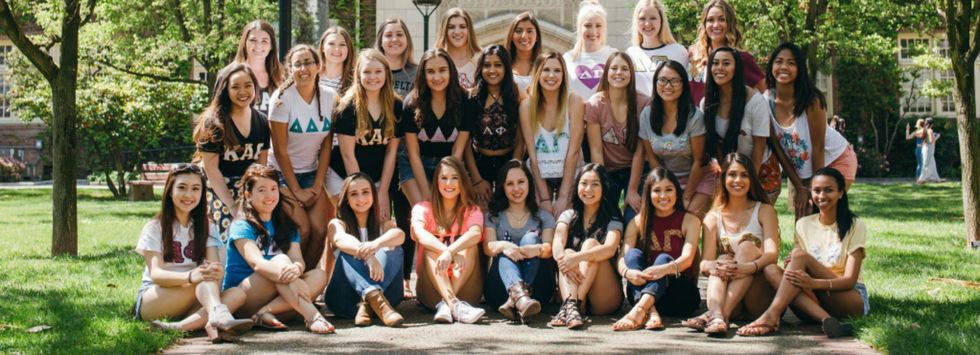I've been a student at University of the Pacific since Fall of 2013, and while I have always been relatively active on campus, it's only now, in my second-to-last year of my undergraduate degree that I am pursuing a social Greek organization.
In Fall of 2013, I officially began courses at my top choice university. Unfortunately, two weeks later, I was hospitalized and diagnosed with Stage II Hodgkin's Lymphoma, forcing me to put my education off for a year. You can read more about that struggle here and here. When I came back in Fall of 2014, I was different, and my actual education took a backseat to having the "college experience." I wanted to be social, as I hadn't been so for the last year. The result of my poor decisions? I failed two classes and started off my college career with a horrid GPA.
That poor GPA meant two things: I was at risk of being booted out of college, and I couldn't join any organizations on campus, most of which required a GPA of 2.5 and higher. So even when I met many women of the social Greek organizations at Pacific, even when I heard of their philanthropies, and even when I fell head-over-heels in love with Tri-Delta, I was not able to pursue them. Until this semester.
Now, all of the organizations on campus have their merits, and all of them are wonderful, beautiful places that serve as home for many wonderful people, but I did choose Tri-Delta for a few different reasons, which I want to elaborate on further.
As I got to know some of the people in my classes, I realized that a lot of them were in social organizations on campus. I became very good friends with a couple of women from Tri-Delta my very first semester on campus, and all of them were very friendly and helpful. That semester was rough on me for many reasons, namely that the university habitually treated me like a freshman socially, but a sophomore educationally, and I was often left to fend for myself. The women I met from the social sororities were adept at lending a hand and helping me to find my way around campus.
This later led to invitations to the house for meals, and I realized very quickly that not only were all of the members very inviting and friendly, but that I never felt uncomfortable in the house. I always felt welcome, not just by the women of the house, but also by the very atmosphere of the house. It felt like I could simply move in and be extremely happy there.
Then, I learned about their philanthropy, St. Jude's Children's Research Hospital. For those of you who aren't aware, St. Jude's is one of the world's premier pediatric cancer research centers, whose main mission is to find cures for childhood cancers. For obvious reasons, St. Jude's is very near and dear to my heart. While I was never treated there, their research helps to provide the cure that rid me of cancer. Their hard work and research is imperative to putting an end to needless deaths from one of the most awful diseases a person can develop.
There are so many stereotypes surrounding social sororities and fraternities, most of which are negative and many of which are blatantly untrue in modern society. One of the usually-positive stereotypes of social sororities is the irrevocable bond of sisterhood that comes with becoming a member. I had the tendency to disregard most of these stereotypes, as I wanted to start from scratch and form my own opinions about the women and the atmosphere. However, the theory that there is an immediate bond with your sisters is absolutely true for me.
I didn't pursue Tri-Delta with the thought of sisterhood and friendship, but I absolutely found it. Amidst my pledge class, I've found a family, and among my soon-to-be sisters, I've found a home away from home. I'm undeniably excited to be pledging for a sorority I love with women I love, and that's really more than I could ask for.

















